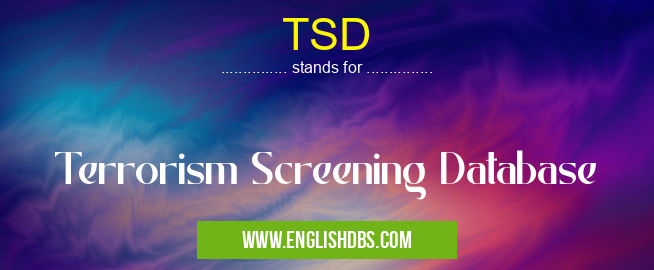What does TSD mean in DATABASES
The Terrorism Screening Database, also commonly referred to as the TSD, is a secure system maintained by the Department of Homeland Security and the FBI that keeps records of individuals who have been deemed of potential threat or linked to terrorism. The nationwide database contains both biographical and biometric data, such as fingerprints and photographs, with the purpose of quickly identifying terrorists or other individuals posing a threat to national security.

TSD meaning in Databases in Computing
TSD mostly used in an acronym Databases in Category Computing that means Terrorism Screening Database
Shorthand: TSD,
Full Form: Terrorism Screening Database
For more information of "Terrorism Screening Database", see the section below.
Benefits Of The Terrorism Screening Database
The TSD provides many benefits for those responsible for protecting citizens from terrorism. By compiling detailed profiles from multiple sources into one secure database, it minimizes any gaps in coverage while providing critical information in real time. This ensures decision makers have access to the most up-to-date intelligence available when making decisions regarding possible threats or persons of interest associated with terrorism activities. Additionally, by combining biometrics with traditional watchlist data it drastically reduces inaccurate identifications and time delays due to misidentification or mixed identities that can occur during manual screening procedures without biometrics verification capabilities.
Essential Questions and Answers on Terrorism Screening Database in "COMPUTING»DB"
What is the TSD?
The Terrorism Screening Database (TSD) is a consolidated terrorist watchlist maintained by the Terrorist Screening Center, an organization within the FBI. This database collects and centralizes biographic and biometric information related to known or suspected terrorists for national security purposes.
Who can access TSD?
Federal government agencies responsible for keeping the country safe have access to TSD, such as the Transportation Security Administration, U.S. Customs and Border Protection, Federal Bureau of Investigation, Department of Homeland Security, U.S. Coast Guard, State Department's Office of Consular Affairs and other associated agencies.
How often is TSD updated?
The Terrorist Screening Center continuously updates information in the Terrorism Screening Database (TSD). All changes to records must be approved by authorized personnel before they are published in the system and made available to users.
Where does TSD get its data?
Data for the Terrorism Screening Database come from terrorist watch lists compiled by intelligence agencies across the world. These watchlists include information about individuals who have been identified as potential threats to national security or interest.
Does TSD contain personal data?
Yes, personal data including name, date-of-birth (DOB), nationality, place-of-birth (POB) and photograph are included in the Terrorism Screening Database along with unique identifiers like fingerprints and iris scans for each subject of interest if available.
Is TSD regulated by any laws?
Yes, the use of data stored in TSD is regulated by several federal laws such as Immigration & Nationality Act (INA) 8 USC 1182(f), Privacy Act of 1974 5 USC 552a and Executive Order 13224 among others.
What are some common uses of TSD?
Common uses of data stored in The Terrorism Screening Database include conducting airport screenings at ports-of-entry (POE), verifying travel documents submitted by visa applicants through embassies abroad or performing background checks on individuals seeking certain jobs with security clearance requirements like those working in US military services or government contracting organizations with secure facilities.
Are there any consequences for misusing TSDdata?
Any attempts to misuse data from The Terrorist Screening Database will result in enforcement action including criminal prosecution under statutory federal crimes law 18 USC §§1831—1839 or civil penalty action issued under Title 18 USC 1519—1520 if deemed applicable according to an investigation conducted by authorities.
Can I request access to my own record from TSD?
No civilian requests can neither be made nor granted access directly into The Terrorism Screening Database due to restrictions set forth by applicable laws governing its use but you may contact your nearest local FBI office where you may be assisted with submitting a request through Freedom Of Information Act procedures
Final Words:
The Terrorism Screening Database (TSD) is an invaluable asset that not only keeps the public safe by ensuring immediate identification of those who pose a risk but also provides beneficial assistance during terrorist events or crisis situations where swift action may be necessary to protect lives and property. Its combination of watchlists from numerous sources coupled with biometrics technology gives government agencies unparalleled accuracy when verifying identities during investigations involving potential terrorists or suspects connected with such incidents.
TSD also stands for: |
|
| All stands for TSD |
